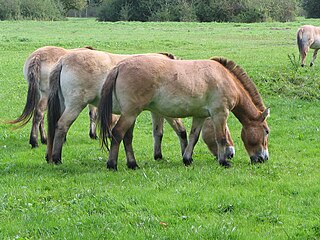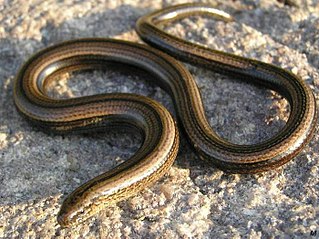
Equidae is the taxonomic family of horses and related animals, including the extant horses, donkeys, and zebras, and many other species known only from fossils. All extant species are in the genus Equus, which originated in North America. Equidae belongs to the order Perissodactyla, which includes the extant tapirs and rhinoceros, and several extinct families.
Genus is a taxonomic rank used in the biological classification of living and fossil organisms as well as viruses, in biology. In the hierarchy of biological classification, genus comes above species and below family. In binomial nomenclature, the genus name forms the first part of the binomial species name for each species within the genus.

Geranium is a genus of 422 species of annual, biennial, and perennial plants that are commonly known as geraniums or cranesbills. They are found throughout the temperate regions of the world and the mountains of the tropics, but mostly in the eastern part of the Mediterranean region.

The bulbuls are a family, Pycnonotidae, of medium-sized passerine songbirds, and includes the greenbul, brownbul, leaflove, and bristlebill. The family is distributed across most of Africa and into the Middle East, tropical Asia to Indonesia, and north as far as Japan. A few insular species occur on the tropical islands of the Indian Ocean. There are over 150 species in 27 genera. While different species are found in a wide range of habitats, the African species are predominantly found in rainforest, whereas Asian bulbuls are predominantly found in more open areas.

Anguidae refers to a large and diverse family of lizards native to the Northern Hemisphere. Common characteristics of this group include a reduced supratemporal arch, striations on the medial faces of tooth crowns, osteoderms, and a lateral fold in the skin of most taxa. The group includes the slowworms, glass lizards, and alligator lizards, among others. The family is divided into three subfamilies, and contains about 100 species in 10 genera.
Peter Elzinga was the executive director of the Progressive Conservative Party in Alberta, Canada, a former Member of Parliament in the House of Commons of Canada and former cabinet minister in Alberta.

Henry Wriothesley, 2nd Earl of Southampton, was an English peer.

Eciton is a New World army ant genus that contains the most familiar species of army ants. The most predominant and well-known species is Eciton burchellii, which is also more commonly known as the army ant and is considered the type species.
Kenneth G. Elzinga is the Robert C. Taylor Professor of Economics at the University of Virginia. He is an antitrust expert and co-authored a highly successful trio of murder mystery novels in which the sleuth, dubbed Henry Spearman, solves the murder using principles of economics.

BVV Barendrecht is a football club from Barendrecht, Netherlands. The club was founded on 12 February 1926 and plays its matches at Sportpark de Bongerd. With more than 2000 members, Barendrecht is one of the largest amateur clubs of the Netherlands in membership.
Ascidae is a family of mites in the order Mesostigmata.
Rettenmeyerius is a genus of mites in the family Ascidae.
Larvamima is a genus of mites placed in its own family, Larvamimidae, in the order Mesostigmata. Larvamima contains four recognized species:
Circocylliba is a genus of mites in the order Mesostigmata, placed in its own family, Circocyllibamidae.

Uropodidae is a family of mites in the order Mesostigmata.
Antennequesoma is a genus of tortoise mites in the family Uropodidae. There are at least two described species in Antennequesoma.
Trichocylliba is a genus of tortoise mites in the family Uropodidae. There are about seven described species in Trichocylliba.
William Breit (1933–2011) was an American economist, mystery novelist, and professional comedian. Breit was born in New Orleans. He received his undergraduate and master's degrees from the University of Texas and his Ph.D from Michigan State University in 1961. He was an Assistant and Associate Professor of Economics at Louisiana State University (1961-1965) On the recommendation of Milton Friedman he was interviewed and hired at the University of Virginia where he was Associate Professor and Professor of Economics (1965-1983). He returned to his San Antonio as the E.M. Stevens Distinguished Professor of Economics at Trinity University in 1983 and retired as the Vernon F. Taylor Distinguished Professor Emeritus in 2002. He is considered an expert in the history of economic thought and anti-trust economics. He established the Nobel Laureate Lecture Series at Trinity University and is most notable as a mystery novelist where their murder mysteries are solved by applying basic economic principles.

The Solanaceae, or nightshades, are a family of flowering plants that ranges from annual and perennial herbs to vines, lianas, epiphytes, shrubs, and trees, and includes a number of agricultural crops, medicinal plants, spices, weeds, and ornamentals. Many members of the family contain potent alkaloids, and some are highly toxic, but many—including tomatoes, potatoes, eggplant, bell and chili peppers—are used as food. The family belongs to the order Solanales, in the asterid group and class Magnoliopsida (dicotyledons). The Solanaceae consists of about 98 genera and some 2,700 species, with a great diversity of habitats, morphology and ecology.

Arthur (Tuur) Elzinga is a Dutch politician and trade unionist. Between 2007 and 2016 he served in the Senate of the Netherlands representing the Socialist Party. Since 2018, he is a vice-president of the trade union confederation FNV with responsibilities for pensions and international affairs.









